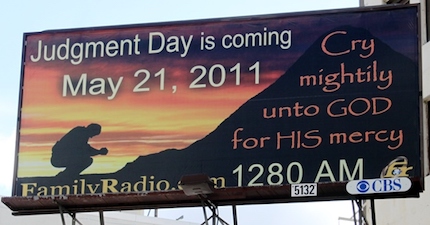The sensationalist zeal of some writers and self-proclaimed experts in eschatology is as big as their incapacity to get it right.
 Ruins of a Christian church in Syria. /
Ruins of a Christian church in Syria. /
I am old enough to have realised that the temptation of using the Bible as a pretext for a sensationalist interpretation of certain prophetic passages still enjoys much popularity.
Almost no occurrence in the Middle East is too irrelevant that someone isn’t able to find in it the fulfilment of some Bible prophecy. Since the times of Hal Lindsey this type of ‘pop eschatology’ has not stopped providing good results in terms of selling books, although these after a few years are not even worth the paper on which are written the extravagant eschatological interpretations. Lindsey’s books have made him rich, but recently there not been much demand. And this is with good reason; they are completely obsolete and disproved by events.
I only want to mention some of the supposed fulfilling in the last 40 years. My personal memory on this topic only goes back as far as the 1970s, when Communism empowered Angola, Mozambique, Vietnam as well as in a number of other countries. A third of the world was under the power of Marx’s disciples and Moscow was considered to be the capital of the antichrist.
Five years after this arrived Khomeini and the Islamic Revolution. For some authors there was no doubt about it, the antichrist had appeared, this time flying from Paris to Tehran, and many tried to prove that this man was nothing less than the fulfilment of Old Testament prophecies and that the rapture was just around the corner.
Later, in April of 1986, the catastrophe of Chernobyl took place. “Chernobyl” in Ukrainian means “wormwood” and according to this type of eschatology this was the fulfilment of Revelation 8:11.
In the same year Spain and Portugal entered into the European Union. There were then 12 member states and therefore we were witnessing the fulfilment of the prophecy of Revelation 12 and about to see the Antichrist’s reign become reality.
 A book by Hal Lindsey. The author changed his predictions about the Apocalypse several times.
A book by Hal Lindsey. The author changed his predictions about the Apocalypse several times.After this arrived the year 1988, 40 years after the foundation of the State of Israel. Hundreds of books tried to prove that a generation had passed since the re-formation of Israel and therefore we were about to enter into the Great Tribulation. In view of this situation, really it is worth making plans for tomorrow?
Two years later Saddam Hussien occupied Kuwait. Not only did this man aim to take over all of the Middle East, but furthermore he dared to reconstruct Babylonia. There was no doubt about it, old prophecies were fulfilled before our very eyes. When they finally found the “antichrist” Saddam in a hole, few Christians with prophetic inclinations remembered the dismal failure of the Evangelical books published in his honour wanting to identify him as the revived Nebuchadnezzar.
In 1994 Harold Camping, founder of Family Radio, proclaimed with absolute conviction that the hour of Christ’s second coming was now. Thousands of his followers were left without houses or money because they had sold or given everything away. Christ did not return. Neither did he return the following March, as Camping announced after having failed in his first attempt. Nor had the Great Tribulation started as far as it is known.
The Twin Towers fell in 2001 and some pop eschatology experts found the fulfilment of Isaiah 20:25 in said event.
I won’t continue with the list so as not to bore you. I haven’t mentioned the blood moons, global warming, the nuclear threat of North Korea, nor Putin, Trump or Merkel as fulfilments of various prophecies and candidates for being the antichrist.
All these “fulfilments” of prophecies do not indicate the beginning of the great tribulation nor anything else mentioned in the Bible. But the memory of some believers is short and the sensationalist zeal of some writers and self-proclaimed experts in eschatology is as big as their clear incapacity to get it right. We quickly forget and then along comes the next expert to tell us that we are before a great event of apocalyptic nature because something that is clearly announced in the Bible has just taken place, and that this time, it means business.
 Harold Camping of Family Radio led a campaign announcing the end of the world.
Harold Camping of Family Radio led a campaign announcing the end of the world. And thus we arrive to the year 2018 when we find out that the civil war in Syria and the bombing in Damascus is the fulfilment of Isaiah 17:1-3. This news has gone viral on social media and beyond.
The prophecy in question forms part of a wider context, from which comes various announcements about coming judgements on the nations that surround Judah at the hands of the Syrians. In fact, it is precisely this concrete and well structured context that allows us to understand the prophecy in Isaiah 17 as a fulfilled prophecy.
Why? For the simple reason that chapter 17 does not only pronounce judgement on Syria and its capital Damascus but also on its ally Israel, the Northern Kingdom. This context is so evident that even Charles Ryrie and John McArthur (dispensationalists and firm defenders of the pre-millennium/pre-tribulation theory), in the footnotes of the study Bibles that bear their names, leave no doubt that we are talking about a prophecy that was fulfilled 2,700 years ago.
This prophecy was fulfilled in the year 732 BC to be exact. The end of Damascus came when the King of Judah, Ahaz, called the Assyrians to help him against the coalition of Israel (the Northern Kingdom) and Syria, with their king Rezin (2 Kings 16:5-9). The Syrian King Tiglath-Pileser, who we know in the Bible under the name Pul, first destroyed Syria and its capital in 732 BC. Ten years later Israel, with its capital Samaria, was then destroyed. This was the end of Syria as an independent Aramaic state. Damascus was destroyed as a city although subsequently reconstructed, like other cities whose destruction is also mentioned in Isaiah. One of the most detailed studies on this destruction was carried out by the Slovenian professor Peter Dubowsky.
I think that it is evident that the misuse of the Bible as a mine from which to prove that certain current events are clearly being heralded by prophets and apostles is not a good idea. All that is achieved through this type of exegesis is simply to confuse believers and make those who are not believers laugh. As evangelical Christians we should be rigorous in our way of interpreting the Bible, taking into account its historical context.
So that no one misunderstands me, of course I believe in Biblical prophecy. I believe that all the prophecies of the Old Testament referring to the coming of the Messiah have been completed with astonishing accuracy, the same way that the prophecies that talk of His second coming and the coming judgement will also be fulfilled. However, I have serious doubts about whether it is ethical and theological sustainable to try and do an exegesis of the Bible while reading it with the day’s newspaper in one’s hand. Churchill already said it: there is nothing so old as yesterday’s newspaper.
José Hutter is Pastor of a church in Madrid (Spain), and Chair of the Theology Group of the Spanish Evangelical Alliance.

Las opiniones vertidas por nuestros colaboradores se realizan a nivel personal, pudiendo coincidir o no con la postura de la dirección de Protestante Digital.
Si quieres comentar o